Story by Mallika Naguran
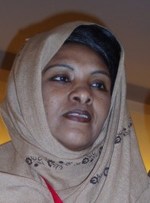
Balgis a true role model for women of Africa.
Dr Balgis Elasha-Osman is no stranger to world environment.
This inspirational Sudanese is a winner of the Champions of the Earthawarded by the United Nations Environment Program (UNEP) in April 2008 and a Nobel Peace Prize laureate as leading author with the Intergovernmental Panel for Climate Change (IPCC) in December 2007.
Distinguished scientists forming the IPPC over the years were recognized for their systematic efforts in studying and advising the United Nations on the impacts of climate change to the world. The peace prize was shared equally with Al Gore, former US Vice President and chief advocate of the environment.
Balgis as Principal Investigator with the Higher Council for Environment and Natural Resources (HCENR) based in Khartoum, Sudan focuses her work on sustainable development. Her expertise lies in vulnerability and adaptation assessment plus documenting greenhouse gas inventories.
This amazing Muslim in her 40s arrived to her newfound status only by wrestling down prejudices, conventions and violence in a country that knows bloodshed too well, and standing by her conviction over two decades to protect the livelihood of the people by showing them how to adapt to harsh climates in Africa.
I caught up with the Sudanese chief scientist in Singapore during the Champions of the Earth award presentation ceremony, and asked her about her work and motivations.
Describe your early work in the 1980s when you first started the fuelwood program.
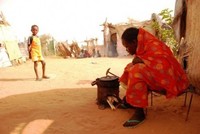
CHF improved stove in 2008 uses 75% less fuel wood and halves cooking time, benefitting Darfur mothers.
I began my working career at Forests National Corporation in a Fuelwood Development for Energy Project. We disseminated information on forest protection to people in rural areas of Sudan, helping them establish local nurseries planting Acacia and Eucalyptus, and introducing the idea of community forestry.
You introduced a new type of stove to replace the fuelwood guzzling traditional three-stone stove.
We initiated the energy conservation program and distributed improved stoves freely to women from more than 70 villages in different regions of Sudan. The objective was to release the pressure from the natural forest and consequently maintain the green cover.
The Azza stove is a Sudanese version of the Thai bucket stove. The inner part of the stove is made of burned clay while the outer case is metal, hence consumes 50% less of the usual amount of charcoal in traditional stoves. So a family who uses two sacks of charcoal per month will be using only one sack.
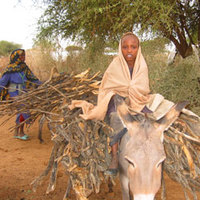
Gender-based violence is rife in war-torn Darfur. Main target, women and girls collecting fuelwood.
One other reason for promoting the improved stove, I understand, is to minimize the danger of violence and rape to women and children in going out to collect fuelwood during tribal conflicts.
Actually this was one of our key messages to convince the women to adopt the improved stoves, beside the saving of fuel and time and its being clean and efficient.
How did the early work give you an insight into climate change?
Historically, rural people in Sudan have suffered the impacts of climate variability on their livelihoods; variability took the form of erratic rainfall, drought and floods. The forestry extension program gave me the chance to travel to many remote areas, learn more about rural people and understand their specific needs and problems, as well as try to help them find solutions. This is very similar to our current work and studies on vulnerability and adaptation to climate change.
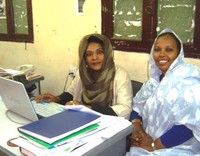
Hana Hamadalla says of her PHD supervisor:"Balgis is a hard worker, creative and loves her work very much (but only after me)!"
You work in different directions, from directing researches, conducting assessments and training to serving in many international scientific and technical committees plus advisory boards. Having won the award, what goals have you set for yourself?
The award gives me the motivation and the courage necessary to continue my work and to face all the barriers along the way. I wish to give more time to action-oriented research to find solutions and to communicate these to people who really need them.
I want to dedicate more time to finding ways and means for bridging gaps between scientists, communities and policymakers. And more time to creating awareness and educating people on how to care for the environment, conserve their livelihoods and maintain their wellbeing.
What is the most satisfying achievement?
I think the greatest satisfying achievement is to be identified by UNEP as one of the leaders in protecting our planet. It is also the greatest responsibility for me to lead by doing.
Another important achievement is the networks created at the national, regional and international levels e.g. AIACC, IPCC. I have known many great scientists as we have been working together as a team with a common purpose. It’s important to maintain this cooperation with the same level of interest and devotion to all that we do in order to make a difference to our communities and the world.
Who is your greatest inspiration?
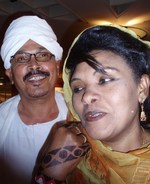
"She has a high sense of responsibility towards her family and the whole of Sudan," says husband Mhd Omer ElGindi.
I came from a large family with 10 siblings. My father, Mohamed Elhassan, worked in Barclays Bank in Khartoum, however his salary was not enough to support us. So he took up an additional job - running the bank's restaurant. My mother and older sisters used to assist him by preparing the food for very long hours every night.
My father used to take the food to the bank's restaurant every morning in a big box tied to his bicycle. It took him 75 minutes to reach the bank by bicycle, and that was why he used to start his day early at 5:30 am, right after the Morning Prayer.
His life was a long struggle. From him I learned the value of work and the essence of working hard to secure your living and fulfill your dreams. He was my model - peace be upon his soul.
Champions of the Earth is an international environment award established in 2004 by the United Nations Environment Programme (UNEP). The annual prize rewards individuals who have made significant and recognized contribution globally, regionally and beyond, to the protection and sustainable management of the Earth's environment and natural resources.
The 2008 Champions of the Earth are: Balgis Osman-Elasha, a senior researcher at Sudan's Higher Council for Environment & Natural Resources; Atiq Rahman, the Executive Director of the Bangladesh Centre for Advanced Studies; Liz Thompson, the former Energy and Environment Minister of Barbados; and Abdul-Qader Ba-Jammal, the Secretary General of the Yemen People's General Congress.
Past Champions of the Earth winners include Ms. Massoudeh Ebtekar, the former Vice President of Iran; H.E. Mikhail Gorbachev of the Russian Federation; H.R.H. Prince Hassan Bin Talal of Jordan; Jacques Rogge and the International Olympic Committee; and Al Gore, the former Vice President of the United States.
Photos by Mallika Naguran and courtesy of Hana Hamadalla, Refugee International and CHF International.